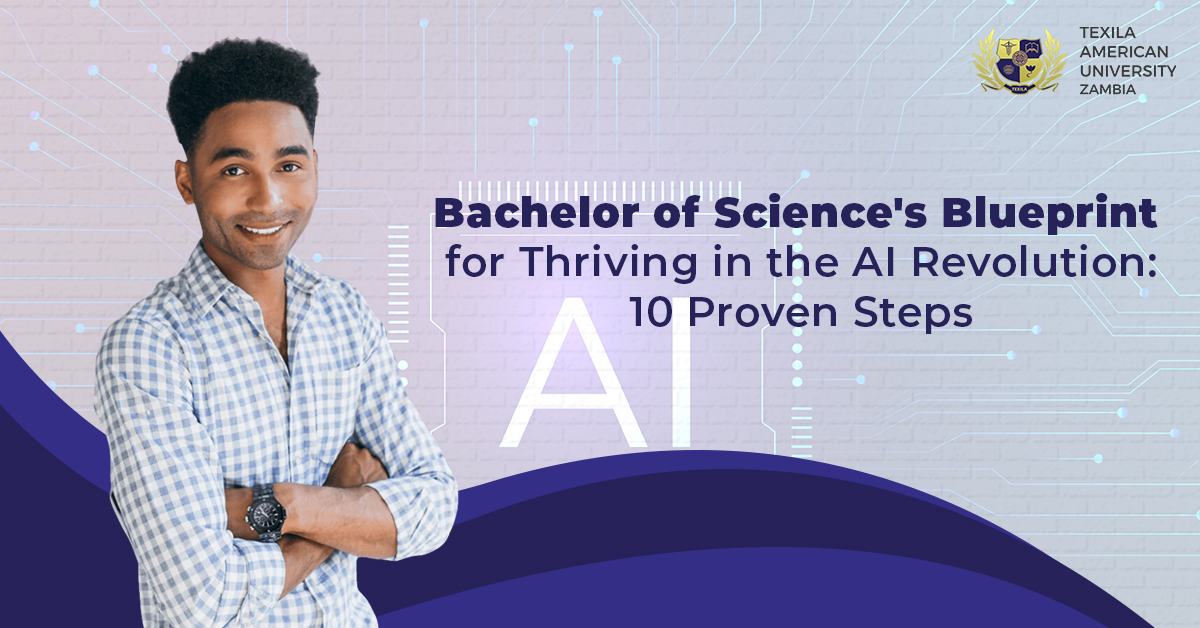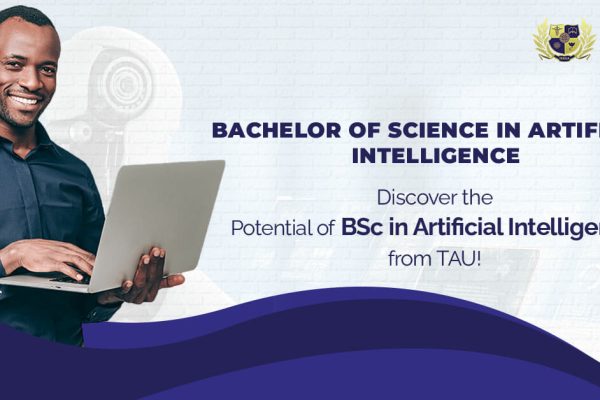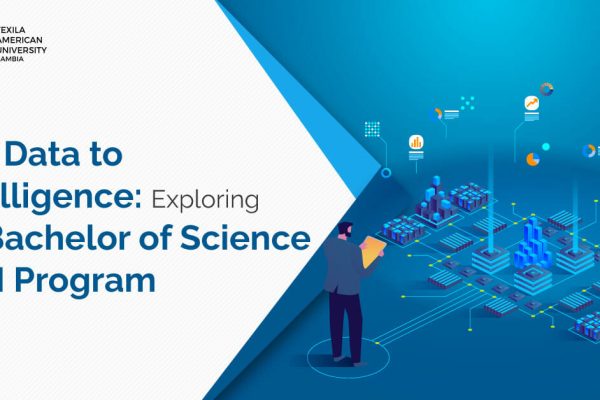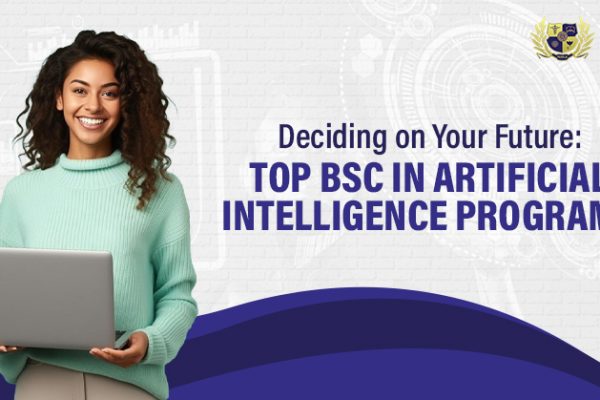|
Tired of Reading? Please listen to the blog
|
Blog Summary
The growing significance of Artificial Intelligence (AI) across diverse industries has revolutionized the way we approach technology, innovation, and problem-solving. With AI rapidly transforming sectors like healthcare, finance, manufacturing, and more, its integration has become pivotal for businesses to stay competitive and efficient in the modern landscape. Amidst this AI revolution, pursuing a Bachelor of Science degree in Artificial Intelligence (BSc in AI) stands as a crucial pathway towards equipping oneself with the specialized skills and knowledge required to navigate this evolving landscape. This degree not only offers a comprehensive understanding of AI fundamentals but also empowers individuals to harness the potential of AI-driven solutions. As the demand for AI expertise continues to surge, BSc in AI programs serve as foundational pillars, preparing students to tackle the challenges and seize the abundant career opportunities presented by the AI revolution in education and the professional realm.
- Understanding the AI Revolution
- The Relevance of BSc in AI
- The Blueprint for Success
- Specialization and Focus
- Internships and Industry Exposure
- Building a Strong Network
- Continuous Learning and Adaptation
- Developing Soft Skills
- Creating a Portfolio
- Seeking Mentorship and Guidance
- Job Search Strategies and Career Growth
- Potential Career Paths and Growth Opportunities Post-BSc in AI
- Conclusion
- FAQs
Understanding the AI Revolution
Definition and Scope of Artificial Intelligence
Artificial Intelligence (AI) stands as a pivotal force reshaping industries across the board. Its expansive scope encompasses the development of intelligent systems that simulate human intelligence, enabling machines to learn, reason, and perform tasks autonomously. This revolutionary technology has woven its way into diverse sectors such as healthcare, finance, technology, and more. In healthcare, AI algorithms analyze vast datasets to enhance diagnostics, personalize treatment plans, and even predict potential health issues. Likewise, in finance, AI-driven algorithms power trading decisions, risk assessment, fraud detection, and the creation of personalized financial products.
Impact of AI on different sectors
Bachelor of Science in AI program emerges as a linchpin for aspiring professionals seeking to navigate and thrive in the AI revolution. The growing integration of AI in diverse sectors has fueled an unprecedented demand for skilled individuals adept at leveraging this technology. A BSc in AI equips students with a robust understanding of machine learning, neural networks, data analysis, and other essential facets of AI. Through comprehensive coursework and hands-on projects, students not only grasp theoretical concepts but also gain practical experience in developing AI-driven solutions.
Why BSc in AI is crucial in the current job market?
The current job market reflects a significant shift toward AI-driven roles and initiatives, making a BSc in AI an increasingly vital credential. Employers seek professionals well-versed in AI technologies to drive innovation, optimize processes, and derive actionable insights from vast datasets. From AI engineers and data scientists to AI ethicists and analysts, the career opportunities in this domain are diverse and burgeoning. The interdisciplinary nature of AI degree programs equips graduates with a versatile skill set, fostering adaptability and problem-solving abilities, which are highly valued in today’s competitive job market.
The Relevance of BSc in AI
Specific skills and knowledge gained through a BSc in AI
Bachelor’s in Artificial Intelligence offers a comprehensive educational pathway that equips students with a versatile skill set tailored for the evolving landscape of technology and innovation. Throughout this program, students delve into various disciplines encompassing machine learning, data analytics, programming languages, and neural networks. These fundamental pillars empower individuals with a deep understanding of AI’s core concepts, laying a robust foundation for practical application. AI degree programs often integrate hands-on projects and case studies, fostering critical thinking and problem-solving abilities.
How these skills align with the demands of the AI-driven industry?
The skills cultivated through a BSc in AI perfectly align with the escalating demands of today’s AI-driven industry. Graduates emerge adept in handling vast datasets, deciphering patterns, and crafting innovative solutions. Proficiency in programming languages such as Python, R, and Java, combined with a thorough comprehension of algorithms and statistical modeling, positions BSc in AI holders as valuable assets in the competitive job market.
Career opportunities available with this degree
The completion of a Study Best AI learning unlocks a myriad of exciting and rewarding career opportunities. AI is revolutionizing numerous sectors, including healthcare, finance, cybersecurity, and automation. Graduates find themselves sought after for roles such as AI engineer, data scientist, machine learning specialist, and AI consultant. Companies across diverse industries actively seek individuals equipped with AI education pathways due to their ability to harness data-driven strategies and pioneer groundbreaking advancements. The spectrum of possibilities ranges from research and development to leadership positions, offering a fulfilling career trajectory for those passionate about shaping the future through technological innovation.

The Blueprint for Success
Mastering Fundamentals
Mastering the fundamentals in Artificial Intelligence (AI) is paramount for a successful journey in this field. A comprehensive grasp of core concepts such as machine learning, neural networks, algorithms, and their interplay forms the bedrock for delving into advanced applications. Understanding these basics lays the groundwork for innovation and problem-solving in AI technology. Proficiency in foundational principles not only facilitates the creation of sophisticated AI systems but also enables professionals to navigate complexities, adapt to evolving methodologies, and contribute meaningfully to the industry’s advancements.
Practical Application through Projects
Hands-on experience through AI projects during a Bachelor of Science program plays a pivotal role in shaping future AI professionals. The significance lies in the practical application of theoretical knowledge, allowing students to grasp complex AI concepts and methodologies effectively. Through such projects, students can work on real-world applications like developing predictive models for healthcare diagnostics, creating recommendation systems for e-commerce platforms, or implementing natural language processing algorithms for language translation. These practical exercises not only reinforce classroom teachings but also provide invaluable insights into the challenges and intricacies of applying AI in diverse industries.
Specialization and Focus
Exploring Specialized Areas in AI: Aspiring AI professionals benefit immensely from delving into specialized domains such as natural language processing and computer vision. These areas offer in-depth insights into how machines comprehend and process language or interpret visual data, respectively. By engaging in projects focused on these niches during a BSc in Artificial Intelligence, students gain hands-on experience, honing their skills and understanding of these critical facets within AI.
Benefits of Specialization for Career Prospects: Specializing in particular AI domains equips individuals with a focused expertise highly sought after in the industry. Mastery in specialized areas enhances career prospects significantly, allowing graduates to stand out in a competitive job market. Employers often seek candidates who possess deep knowledge and practical experience in these specialized AI fields, providing better job opportunities and career advancement potential.
Internships and Industry Exposure
Internships hold a pivotal role in the journey of a Bachelor of Science in Artificial Intelligence (BSc AI) student, offering invaluable practical exposure that textbooks often can’t emulate. These hands-on experiences within real-world settings immerse students in the intricacies of AI applications, allowing them to apply classroom knowledge to actual industry challenges. By participating in internships, BSc AI students gain a deep understanding of how AI functions within different industries, fostering a more profound comprehension of its real-world applications.
Internships effectively bridge the divide between academic learning and industry demands. They serve as a direct passage through which BSc AI students can connect theoretical knowledge gained in classrooms with the practical requirements of the AI industry. This connection is crucial as it helps students contextualize their academic learning, understand industry-specific challenges, and adapt their skills accordingly. Internships provide an avenue for students to witness firsthand the challenges, trends, and innovations within the AI domain, enabling them to align their skill sets with the actual needs of employers.
Building a Strong Network
Networking stands as a pivotal tool for aspiring professionals pursuing a Bachelor of Science degree in Artificial Intelligence. Establishing robust connections can open doors to invaluable opportunities, offering insights into the industry’s trends, potential career paths, and access to a supportive community. During the BSc program, students can engage in various avenues to build a strong network. Participation in AI-related seminars, workshops, and industry conferences allows for direct interaction with experts and peers. Leveraging social media platforms, professional forums, and online communities specialized in AI fosters connections with professionals worldwide.
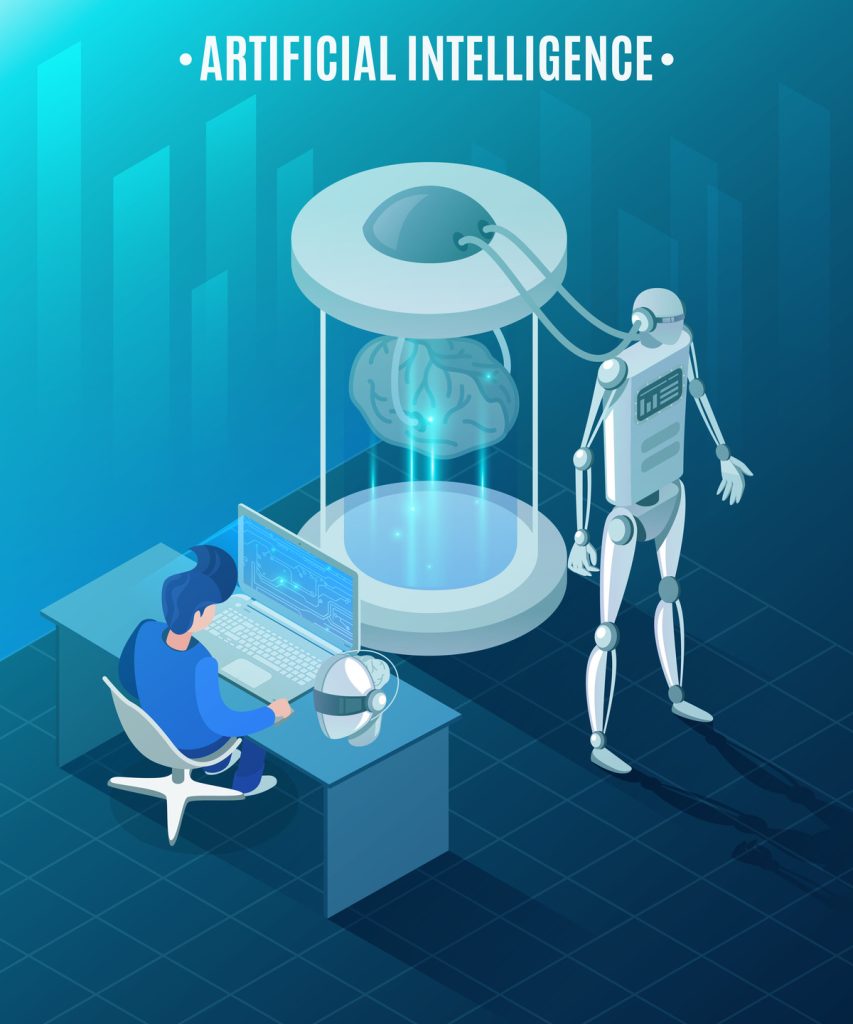
Continuous Learning and Adaptation
In the dynamic landscape of Artificial Intelligence, continual learning and adaptation serve as keystones for staying at the forefront of innovation. Platforms such as Coursera, Udacity, and edX offer a diverse range of courses, workshops, and certifications, providing invaluable resources to upskill and deepen understanding in specialized AI domains. Additionally, staying connected with industry-specific forums, attending conferences, and engaging in AI communities like Kaggle or GitHub not only fosters continuous learning but also facilitates networking opportunities, allowing individuals to exchange insights and collaborate on cutting-edge projects.
Developing Soft Skills
Importance of Soft Skills in AI: Soft skills, such as communication, critical thinking, and adaptability, are fundamental pillars enhancing the prowess of technical experts in the AI field. While technical expertise forms the backbone of AI innovation, it’s the soft skills that enable professionals to effectively communicate complex ideas, collaborate seamlessly within multidisciplinary teams, and navigate through dynamic challenges. In the realm of Artificial Intelligence, where problem-solving is intricate and multidimensional, possessing strong interpersonal skills empowers professionals to articulate solutions, bridge the gap between technical jargon and layman terms, and foster an environment of creativity and innovation.
Complementing Technical Expertise: In the AI domain, where intricate algorithms and data analysis converge, the amalgamation of soft skills and technical know-how is indispensable. Communication skills facilitate conveying complex AI-driven concepts to diverse stakeholders, enabling effective teamwork, and fostering a shared understanding across departments. Problem-solving skills are equally vital, as they empower AI professionals to tackle multifaceted challenges by approaching them from various angles, fostering innovation, and identifying creative solutions.
Creating a Portfolio
Crafting a compelling portfolio is paramount, offering a snapshot of one’s skills and showcasing the practical application of knowledge gained during a Bachelor’s in AI Course. To make an impactful impression in AI-related roles, aspiring professionals should focus on presenting diverse projects, highlighting problem-solving abilities, and displaying proficiency in various AI subfields like machine learning, natural language processing, or computer vision. Employers seek evidence of practical experience, so including tangible outcomes, such as successful project implementations or innovative solutions, within the portfolio is essential.
Seeking Mentorship and Guidance
Mentors serve as invaluable resources, offering insights, experience, and wisdom that accelerate professional development. Within the AI industry, finding mentors can be accomplished through various channels. Networking events, industry conferences, and online platforms dedicated to AI professionals such as forums, LinkedIn groups, or mentorship programs offered by educational institutions are excellent starting points. Additionally, reaching out to professionals already established in AI through personalized emails or attending workshops can create mentorship opportunities.
Job Search Strategies and Career Growth
Build a strong foundation in AI: Make sure you have a solid understanding of the fundamentals of AI, including machine learning, natural language processing, and computer vision. You can take online courses, read books and articles, and attend workshops or conferences to learn more about AI.
Develop your technical skills: AI professionals need to have strong programming skills, as well as a familiarity with data analysis and statistics. You can develop these skills by taking coding classes, working on personal projects, and participating in online coding challenges.
Network with other AI professionals: Networking is essential for any job search, but it’s especially important in the AI field. Attend meetups, join online forums, and connect with other AI professionals on LinkedIn.
Potential Career Paths and Growth Opportunities Post-BSc in AI
Machine learning engineer: Machine learning engineers design, develop, and implement machine learning algorithms to solve real-world problems.
Data scientist: Data scientists collect, analyze, and interpret data to extract meaningful insights. They use these insights to make informed decisions about business strategy, product development, and customer service.
AI researcher: AI researchers conduct research to advance the field of AI. They develop new algorithms, improve existing methods, and explore new applications for AI.
The demand for AI professionals is expected to grow by 33% from 2020 to 2030. With an average salary of $126,000 per year, careers post-BSc in AI offer diverse opportunities such as becoming a machine learning engineer, data scientist, or AI researcher. These roles involve designing cutting-edge algorithms, extracting valuable insights from data, and pioneering advancements in the field of artificial intelligence.
Conclusion
Pursuing a Bachelor of Science degree in Artificial Intelligence (BSc in AI) presents an indispensable pathway for individuals aspiring to thrive in the AI revolution. This comprehensive program not only equips students with a robust understanding of AI fundamentals but also empowers them to apply this knowledge practically across diverse industries. The amalgamation of theoretical insights, hands-on projects, and specialized skills positions BSc in AI graduates as sought-after assets in the evolving job market. Embracing continuous learning, seeking mentorship, and honing both technical and soft skills are key facets that pave the way for a successful career journey in this dynamic and ever-expanding domain.

